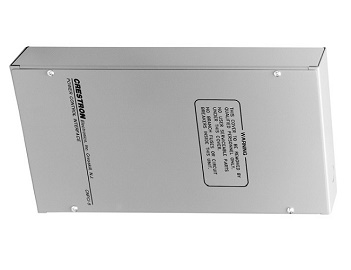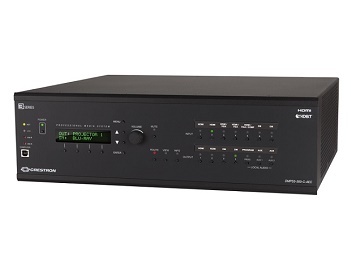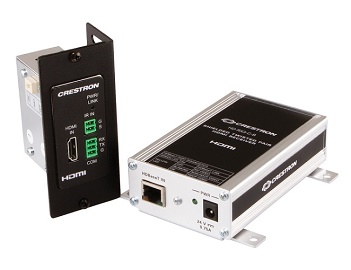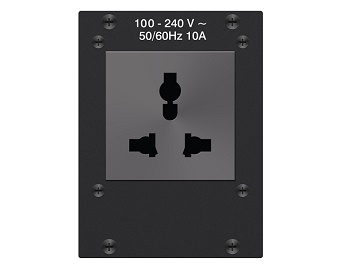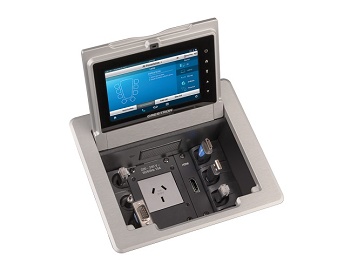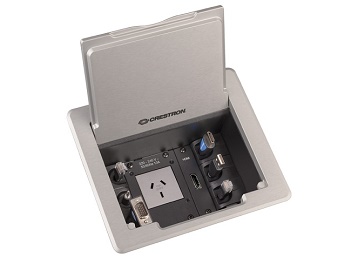概述
Operating System
Crestron® 3-Series®; real-time, preemptive, multi-threaded/multitasking kernel; Transaction-Safe Extended FAT file system; supports up to 10 simultaneously running programs; preloaded DMPS3 .AV Framework™ Base Program
Memory
SDRAM 512 MB
Flash 4 GB
Communications
Ethernet 10/100/1000 Mbps, auto-switching, auto-negotiating, auto-discovery, full/half duplex, industry-standard TCP/IP stack, UDP/IP, CIP, DHCP, SSL, TLS, SSH, SFTP (SSH File Transfer Protocol), FIPS 140-2 compliant encryption, IEEE 802.1X, SNMP, BACnet™/IP [10], IPv4 or IPv6, Active Directory authentication, IIS v.6.0 web server, SMTP e-mail client, RSTP, Private Network Mode
Phone POTS (RJ11 wired interface) supporting DTMF & Caller ID, SIP (via Ethernet) supporting peer-to-peer or SIP server mode
Cresnet® Cresnet master mode
USB USB signal routing via select DM transmitters and receivers, or via USB-EXT-DM extenders [8]; USB device port for computer console (setup)
RS-232 2-way device control and monitoring up to 115.2k baud with hardware and software handshaking
IR/Serial 1-way device control via infrared up to 1.2 MHz or serial TTL/RS-232 (0-5 Volts) up to 115.2k baud; supports CNXRMIRD IR Receiver [7]
DigitalMedia™ DM 8G+®, HDCP, EDID, CEC, PoDM, Ethernet
HDBaseT® HDCP, EDID, PoH, Ethernet
HDMI® HDCP, EDID, CEC
NOTE: Supports management of HDCP and EDID; supports management of CEC between the connected HDMI devices and the control system
Video
Switcher 7x4 matrix, auto-switching, auto-detecting multi-format digital/analog source inputs, QuickSwitch HD™ technology
Input Signal Types HDMI w/Deep Color & 3D [4] (DVI & Dual-Mode DisplayPort compatible [2]), DM 8G+ & HDBaseT w/Deep Color & 3D [4], RGB/VGA (RGBHV, RGBS, RGsB) [9], component (YPbPr), S-Video (Y/C), composite (NTSC, PAL)
Output Signal Types HDMI w/Deep Color & 3D (DVI compatible [2]), DM 8G+ & HDBaseT w/Deep Color & 3D [4]
Input Resolutions, HDMI & HDBaseT, Progressive 640x480@60Hz, 720x480@60Hz (480p), 720x576@50Hz (576p), 800x600@60Hz, 848x480@60Hz, 852x480@60Hz, 854x480@60Hz, 1024x768@60Hz, 1024x852@60Hz, 1024x1024@60Hz, 1280x720@50Hz (720p50), 1280x720@60Hz (720p60), 1280x768@60Hz, 1280x800@60Hz, 1280x960@60Hz, 1280x1024@60Hz, 1360x768@60Hz, 1365x1024@60Hz, 1366x768@60Hz, 1400x1050@60Hz, 1440x900@60Hz, 1600x900@60Hz, 1600x1200@60Hz, 1680x1050@60Hz, 1920x1080@24Hz (1080p24), 1920x1080@25Hz (1080p25), 1920x1080@50Hz (1080p50), 1920x1080@60Hz (1080p60), 1920x1200@60Hz, 2048x1080@24Hz, 2048x1152@60Hz, plus any other resolution allowed by HDMI up to 165MHz pixel clock
Input Resolutions, HDMI & HDBaseT, Interlaced 720x480@30Hz (480i), 720x576@25Hz (576i), 1920x1080@25Hz (1080i25), 1920x1080@30Hz (1080i30), plus any other resolution allowed by HDMI up to 165MHz pixel clock
Input Resolutions, RGB 640x480@60Hz, 720x480@60Hz (480p), 720x576@50Hz (576p), 800x600@60Hz, 848x480@60Hz, 1024x768@60Hz, 1280x720@50Hz (720p50), 1280x720@60Hz (720p60), 1280x768@60Hz, 1280x800@60Hz, 1280x960@60Hz, 1280x1024@60Hz, 1360x768@60Hz, 1366x768@60Hz, 1400x1050@60Hz, 1440x900@60Hz, 1600x1200@60Hz, 1680x1050@60Hz, 1920x1080@50Hz (1080p50), 1920x1080@60Hz (1080p60), 1920x1200@60Hz, 2048x1152@60Hz
Input Resolutions, Component 480i, 576i, 480p, 576p, 720p50, 720p60, 1080p24, 1080i25 (1125 lines), 1080i30, 1080p30, 1080p50 (1125 lines), 1080p60
Input Resolutions, Composite & S-Video 480i, 576i
Output Resolutions Matched to inputs
Analog-To-Digital Conversion 10-bit 165 MHz per each of 3 channels
RGB Source Image Adjustments Brightness: 0% to 50%;
Contrast: -50% to +50%;
Fine Phase: -16 to +15;
X Position: -100 to +100;
Y Position: -10 to +10;
RGB Gains: -50 to +50, separately adjustable for Red, Green, and Blue
YPbPr, Y/C, or Composite Source Image Adjustments Brightness: 0% to 50%;
Contrast: -50% to +50%;
Saturation: -50% to +50%;
Hue: -50% to +50%
Audio – General
Switcher/Mixer 8x9 stereo source switcher, auto-detecting multi-format digital/analog source inputs, audio-follow-video or breakaway, 6-channel gated mic mixer w/DSP and AEC, independent 6-ch mic + source mixer per output, dual codec mixer, SIP/POTS audio conferencing interface, independent stereo DSP per analog output, dedicated AEC reference mixer and DSP, integrated power amplifier, 7x4 multichannel source switcher, digital audio mixer bypass mode for multichannel pass-through to digital outputs
Analog-To-Digital Conversion 24-bit 48 kHz
Digital-To-Analog Conversion 24-bit 48 kHz
Frequency Response, Digital & Analog Line Outputs 20 Hz to 20 kHz ±0.5 dB (digital source);
20 Hz to 20 kHz ±0.5 dB (analog line source);
20 Hz to 20 kHz ±0.7 dB (microphone source)
Frequency Response, Speaker Output 20 Hz to 20 kHz ±1 dB @ 20 Watts into 8 Ohms;
100 Hz to 20 kHz ±2.5 dB @ 70 or 100 Volts
S/N Ratio, Digital & Analog Line Outputs >108 dB, 1 kHz, A-weighted (digital source);
>103 dB, 1 kHz, A-weighted (analog line source)
S/N Ratio, Speaker Output 98 dB @ 20 Watts into 8 Ohms, 1 kHz, A-weighted;
96 dB @ 20 Watts into 4 Ohms, 1 kHz, A-weighted
THD+N, Digital & Analog Line Outputs <0.002%, 20 Hz to 20 kHz (digital source);
<0.005%, 20 Hz to 20 kHz (analog line source);
<0.05%, 20 Hz to 20 kHz (microphone source)
THD+N, Speaker Output <0.1%, 1 kHz @ 20 Watts into 4 or 8 Ohms;
<0.7%, 20 Hz to 20 kHz @ 20 Watts into 4 or 8 Ohms
Stereo Separation, Digital & Analog Line Outputs >108 dB (digital source);
>103 dB (analog source)
Stereo Separation, Speaker Output >65 dB @ 20 Watts, 1 kHz
Channel Separation, Digital Outputs >108 dB (digital source);
>103 dB (analog source)
Channel Separation, Analog Line Outputs >103 dB
Speaker Output Modes 4Ω/8Ω stereo, 70V mono, or 100V mono
Speaker Amplifier Output Power 20 Watts RMS per channel @ 8 Ohms, 4 Ohms tolerant;
40 Watts RMS @ 70 or 100 Volts
Audio – Microphone Inputs
Typical of 6 microphone input channels (Mic/Line 1 – 6)
Input Signal Types Mono analog mic or line level
Phantom Power Enable/Disable per channel
Gain 0 to +60 dB Gain adjustment, plus Mute
Delay 0.0 to 85.0 ms
EQ Center Frequencies 50 to 200 Hz (Band 1);
200 to 800 Hz (Band 2);
800 to 3.2k Hz (Band 3);
3.2k to 12.8k Hz (Band 4)
EQ Gain ±12.0 dB per band
High-Pass Filter On or Off
Gating Threshold -80 to 0 dB
Gating Depth (Attenuation) -80 to 0 dB
Gating Attack 1 to 250 ms
Gating Release 1 to 1000 ms
Compression Threshold -80 to 0 dB
Compression Ratio 1:1 to 10:1
Compression Attack 1 to 250 ms
Compression Release 1 to 1000 ms
Compression Curve Hard or soft knee
AEC Enable/Disable
AEC High-Pass Filter Enable/Disable at 80 Hz
AEC Double-Talk Suppression 0.0 to -50.0 dB
AEC Noise Cancellation 0.0 to -50.0 dB
AEC Automatic Gain Control 0.0 to -50.0 dB, plus disable
AEC Bandwidth 20 Hz to 24 kHz
AEC Convergence Rate 80 dB/sec
AEC Tail Length 200 ms
Audio – Source Inputs
Typical of 7 source input channels (Input 1 – 7 & Audio In 1 – 5)
Input Signal Types HDMI (Dual-Mode DisplayPort compatible [2]) on Inputs 1-5, analog 2-channel on Inputs 1-5, S/PDIF on Input 5 only, DM 8G+ & HDBaseT on Inputs 6 & 7
Analog Formats Stereo 2-channel
Digital Formats, HDMI & DM Dolby Digital®, Dolby Digital EX, Dolby Digital Plus [4], Dolby® TrueHD [4], Dolby Atmos® [4]; DTS®, DTS-ES, DTS 96/24, DTS-HD High Res [4], DTS-HD Master Audio™ [4], LPCM up to 8 channels
Digital Formats, SPDIF LPCM 2-channel
Input Compensation ±10.0 dB [3]
Audio – Analog Line & Speaker Outputs
Typical of 1 analog line/speaker output (Program Out & Speaker Outputs) and 2 analog line outputs (Aux Out 1 – 2)
Output Signal Type/Format Stereo 2-channel
Mic 1 – 6 -80 to +10 dB Level adjustment range, plus Mute and Pan
Mics Master -80 to +10 dB Level adjustment range, plus Mute
Source -80 to +10 dB Level adjustment range, plus Mute and Balance
Source Select Inputs 1 – 7 or Dialer
Codec 1 – 2 -80 to +10 dB Level adjustment range, plus Mute and Balance (Codec 1 available at Program Out and Aux 2 Out only, Codec 2 available at Program Out and Aux 1 Out only) [11]
Codec 1 – 2 Source Select Inputs 1 – 7 [11]
Master Volume -80 to +10 dB Level adjustment range, plus Mute and Mono
Speaker Amp On/Off (Program Out only)
Mixer Presets 1 through 5
Bass ±12.0 dB
Treble ±12.0 dB
Equalization 10-band graphic + 4-band parametric
GEQ Center Frequencies 31.5, 63, 125, 250, 500, 1k, 2k, 4k, 8k, 16k Hz
GEQ Gain ±12.0 dB per band
PEQ Center Frequencies 10 to 22000 Hz per band
PEQ Gain -36.0 to +24.0 dB per band
PEQ Bandwidth 0.02 to 3.50 octaves per band
PEQ Types Peaking EQ, High Pass, Low Pass, High Shelf, Low Shelf, Notch
Delay 0.0 to 85.0 ms
Limiter Threshold -80 to 0 dB
Limiter Ratio 1:1 to 10:1
Limiter Attack 1 to 250 ms
Limiter Hold 1 to 200 ms
Limiter Release 1 to 1000 ms
Limiter Curve Hard or soft knee
EQ Presets 1 through 10 (includes Delay and Limiter settings)
Audio – AEC Reference Output (Internal)
Note: Normally set to track the Program Out settings
Source -80 to +10 dB Level adjustment range, plus Mute and Balance
Source Select Inputs 1 – 7 or Dialer
Codec 1 – 2 -80 to +10 dB Level adjustment range, plus Mute and Balance [11]
Codec 1 – 2 Source Select Inputs 1 – 7 [11]
Master Volume -80 to +10 dB Level adjustment range, plus Mute
Bass ±12.0 dB
Treble ±12.0 dB
Equalization 10-band graphic + 4-band parametric
GEQ Center Frequencies 31.5, 63, 125, 250, 500, 1k, 2k, 4k, 8k, 16k Hz
GEQ Gain ±12.0 dB per band
PEQ Center Frequencies 10 to 22000 Hz per band
PEQ Gain -36.0 to +24.0 dB per band
PEQ Bandwidth 0.02 to 3.50 octaves per band
PEQ Types Peaking EQ, High Pass, Low Pass, High Shelf, Low Shelf, Notch
Limiter Threshold -80 to 0 dB
Limiter Ratio 1:1 to 10:1
Limiter Attack 1 to 250 ms
Limiter Hold 1 to 200 ms
Limiter Release 1 to 1000 ms
Limiter Curve Hard or soft knee
EQ Presets 1 through 10 (includes Limiter settings)
Audio – Digital Outputs
Typical of 4 digital outputs (HDMI Output 1 – 2 & DM Output 3 – 4)
Output Signal Types HDMI (DVI compatible [2]) on Outputs 1 & 2, DM 8G+ & HDBaseT on Outputs 3 & 4
Formats Dolby Digital, Dolby Digital EX, Dolby Digital Plus, Dolby TrueHD, Dolby Atmos, DTS, DTS-ES, DTS 96/24, DTS-HD High Res, DTS-HD Master Audio, LPCM up to 8 channels
Mic 1 – 6 -80 to +10 dB Level adjustment range, plus Mute and Pan [3]
Mics Master -80 to +10 dB Level adjustment range, plus Mute [3]
Source -80 to +10 dB Level adjustment range, plus Mute and Balance [3]
Source Select Inputs 1 – 7 or Dialer
Master Volume -80 to +10 dB Level adjustment range, plus Mute [3]
Mixer Presets 1 through 5
Audio – POTS/SIP Dialer Output
Output Signal Types POTS (RJ11 wired interface); SIP (via Ethernet)
Mic 1 – 6 -80 to +10 dB Level adjustment range, plus Mute and Pan
Mics Master -80 to +10 dB Level adjustment range, plus Mute
Source -80 to +10 dB Level adjustment range, plus Mute and Balance
Source Select Inputs 1 – 7
Codec 1 -80 to +10 dB Level adjustment range, plus Mute and Balance [11]
Codec 1 Source Select Inputs 1 – 7 [11]
Master Volume -80 to +10 dB Level adjustment range, plus Mute and Mono
Connectors – Audio/Video Inputs
HDMI INPUT 1 – 5 (5) 19-pin Type A HDMI female;
Digital video/audio inputs;
Signal Types: HDMI, DVI, or Dual-Mode DisplayPort [2,4]
RGB INPUT 3 – 5 (3) HD15 female;
Analog RGB/VGA/video inputs;
Signal Types: VGA, RGB, component, S-Video, or composite [9];
Formats: RGBHV, RGBS, RGsB, YPbPr, Y/C, NTSC or PAL;
Input Level: 0.5 to 1.5 Vp-p with built-in DC restoration;
Input Impedance: 75 Ohms nominal;
Sync Detection: RGBHV, RGBS, RGsB, YPbPr;
Sync Input Level: 3 to 5 Vp-p;
Sync Input Impedance: 2.2k Ohms;
Note: RGB Inputs 3-5 and HDMI Inputs 3-5 are mutually exclusive; HDMI overrides RGB when using the auto-switching feature
Y, PB/Y, PR/C/COMP INPUT 5 (3) BNC female;
Comprises (1) auto-sensing multi-format analog video input;
Signal Types: Component, S-Video, or composite;
Formats: YPbPr, Y/C, NTSC or PAL;
Input Level: 1 Vp-p nominal;
Input Impedance: 75 Ohms nominal;
Note: Video Input 5, RGB Input 5, and HDMI Input 5 are mutually exclusive; HDMI and RGB override Video when using the auto-switching feature
SPDIF INPUT 5 (1) RCA female;
S/PDIF coaxial digital audio input;
Input Impedance: 75 Ohms;
Note: SPDIF Input 5 and HDMI Input 5 are mutually exclusive; HDMI overrides SPDIF when using the auto-switching feature
AUD IN 1 – 5 (5) 5-pin 3.5 mm detachable terminal blocks;
Balanced/unbalanced stereo line-level analog audio inputs;
Input Impedance: 24k Ohms balanced/unbalanced;
Maximum Input Level: 4 Vrms balanced, 2 Vrms unbalanced;
Note: Analog Audio Inputs 1-5, SPDIF Input 5, and HDMI Inputs 1-5 are mutually exclusive; HDMI and SPDIF override Analog Audio when using the auto-switching feature
DM INPUT 6 – 7 (2) 8-pin RJ45 female, shielded;
DM 8G+ inputs, HDBaseT compliant;
PoDM and PoH PSE (Power Sourcing Equipment) ports [6];
Each connects to the DM 8G+ output of a DM transmitter or other DM device, or to an HDBaseT device, via CAT5e or Crestron DM-CBL-8G cable [5]
MC1/LN1 – MC6/LN6 (6) 5-pin 3.5 mm detachable terminal blocks;
Comprises (6) balanced microphone/line audio inputs;
Balanced Mic Input Level: -60 to 0 dBV, 1 Vrms maximum;
Balanced Line Input Level: -31 to +11 dBV, 3.7 Vrms maximum;
Unbalanced Line Input Level: -37 to +5 dBV, 1.85 Vrms maximum;
Mic Input Impedance: 3.9k Ohms balanced;
Line Input Impedance: 19k Ohms balanced, 9.5k Ohms unbalanced;
Phantom Power: 48 Volts DC, software enabled/disabled per channel
Connectors – Audio/Video Outputs
SPEAKER OUTPUT
4?/8? L – R (2) 2-pin 7.62 mm 15A detachable terminal blocks;
4-8 Ohm stereo speaker-level audio output;
Wire Size: Terminals accept up to 14 AWG;
Output Power: 20W RMS per channel stereo at 8 Ohms, 4 Ohms tolerant
SPEAKER OUTPUT 70/100V (1) 2-pin 7.62 mm 15A detachable terminal block;
Transformer-isolated 70 or 100 Volt mono speaker-level audio output;
Wire Size: Terminals accept up to 14 AWG;
Output Power: 40W RMS mono at 70 or 100 Volts;
Note: 4?/8? and 70/100V outputs are mutually exclusive
PROG OUT (1) 5-pin 3.5 mm detachable terminal block;
Balanced/unbalanced stereo line-level audio output;
Output Impedance: 200 Ohms balanced, 100 Ohms unbalanced;
Maximum Output Level: 4 Vrms balanced, 2 Vrms unbalanced
AUX OUT 1 – 2 (2) 5-pin 3.5 mm detachable terminal blocks;
Balanced/unbalanced stereo line-level audio outputs;
Output Impedance: 200 Ohms balanced, 100 Ohms unbalanced;
Maximum Output Level: 4 Vrms balanced, 2 Vrms unbalanced
HDMI OUTPUT 1 – 2 (2) 19-pin Type A HDMI female;
Digital video/audio outputs;
Signal Types: HDMI, DVI [2]
DM OUTPUT 3 – 4 (2) 8-pin RJ45 female, shielded;
DM 8G+ outputs, HDBaseT compliant;
PoDM and PoH PSE (Power Sourcing Equipment) ports [6];
Each connects to the DM 8G+ input of a DM receiver or other DM device, or to an HDBaseT device, via CAT5e or Crestron DM-CBL-8G cable [5]
Connectors – Control & Power
IR/SERIAL OUT 1 – 4 (4) 2-pin 3.5 mm detachable terminal blocks;
IR/Serial output ports;
IR output up to 1.2 MHz;
1-way serial TTL/RS-232 (0-5 Volts) up to 115.2k baud
IR IN (1) 3-pin 3.5 mm detachable terminal block;
For connection of the CNXRMIRD IR Receiver [7];
Allows control from IR wireless remotes using RC-5 command set
INPUT 1 – 4 (1) 5-pin 3.5 mm detachable terminal block;
Comprises (4) programmable digital inputs;
Input Voltage Range: 0 to 24 Volts DC, referenced to GND;
Logic Threshold: 2.5 Volts DC nominal with 1 Volt hysteresis band;
Input Impedance: 10k Ohms at >5 Volts, 1M Ohms at <5 Volts;
Pull-up Resistor: 2.2k Ohms per input
RELAY 1 – 4 (1) 8-pin 3.5 mm detachable terminal block;
Comprises (4) normally open, isolated relays;
Rated 1 Amp, 30 Volts AC/DC;
MOV arc suppression across contacts
COM A – B (2) DB9 male;
Bidirectional RS-232 ports;
Up to 115.2k baud, hardware and software handshaking support
NET (4) 4-pin 3.5 mm detachable terminal blocks;
Cresnet Master ports, paralleled;
Available Cresnet Power: 30 Watts
PHONE (1) RJ11 female;
POTS analog telephone port
SERVICE (1) USB Type B female;
For factory use only
PoDM 48VDC IN (1) 4-pin snap & lock DC power connector, female;
48 Volt DC power input for PoDM power pack [6];
Enables PoDM and PoH power sourcing
100-240V~4.0A 50/60Hz (1) IEC 60320 C14 main power inlet;
Mates with removable power cord, included
G (1) 6-32 screw, chassis ground lug
LAN (1) 8-pin RJ45 female;
10Base-T/100Base-TX/1000Base-T Ethernet port
COMPUTER (front) (1) USB Type B female (cable included);
USB computer console port (for setup only)
Controls & Indicators
NET (1) Yellow LED, indicates Cresnet bus activity
LAN (1) Yellow LED, indicates Ethernet activity
HW-R (1) Recessed pushbutton for hardware reset, reboots the control system
SW-R (1) Recessed pushbutton for software reset, restarts the SIMPL program
POWER (1) Pushbutton and green LED, programmable for system power control
LCD Display (1) Green LCD alphanumeric; adjustable backlight; 2 lines x 20 characters per line; displays input/outputs by name, volume levels, setup menus, signal routing, device info, and other system information
SOFTKEYS (4) Pushbuttons for activation of LCD driven functions and passcode entry
MENU (1) Pushbutton, steps menu back one level
Λ, V (2) Pushbuttons, scroll up or down through menu and adjust menu parameters
ENTER (1) Pushbutton, executes highlighted menu or value
VOLUME (1) Continuous turn rotary encoder, adjusts menu parameters, defaults to Program audio volume
MUTE (1) Pushbutton and red LED, mutes the Program audio output
ROUTE (1) Pushbutton and red LED, selects ROUTE mode to allow routing changes
VIEW (1) Pushbutton and red LED, selects VIEW mode to view current routing
INFO (1) Pushbutton and red LED, selects INFO mode to view AV and device info
INPUT 1 – 7 (7) Pushbuttons and red LEDs, select input to be routed
OUTPUT 1 – 4, PROG, AUX 1 – 2 (7) Pushbuttons and red LEDs, select output destination(s)
SPEAKER OUTPUT (rear) (1) 3-position slide switch, selects the amplifier output configuration
DM INPUT 6 – 7 (rear) (4) LEDs, green LEDs indicate DM link status, amber LEDs indicate video and HDCP signal presence, for each respective port
DM INPUT 6 – 7 PoDM (rear) (2) Green LEDs, indicate upstream device is drawing power over DM for each respective port
DM OUTPUT 3 – 4 (rear) (4) LEDs, green LEDs indicate DM link status, amber LEDs indicate video and HDCP signal presence, for each respective port
DM OUTPUT 3 – 4 PoDM (rear) (2) Green LEDs, indicate downstream device is drawing power over DM for each respective port
LAN (rear) (2) LEDs, bi-color LED (left) indicates Ethernet speed and activity, green LED (right) indicates Ethernet link status
Power Requirements
Main Power 4 Amps @ 100-240 Volts AC, 50/60 Hz
Power Consumption 81 Watts typical
Available Cresnet Power 30 Watts
Power over DM (PoDM) PoDM PSE (Power Sourcing Equipment), each DM INPUT/OUTPUT port supplies up to 15.4 Watts (Class 0-3) to one PoDM Powered Device [6]
Power over HDBaseT (PoH) PoH PSE (Power Sourcing Equipment), ), each DM INPUT/OUTPUT port supplies up to 15.4 Watts (Class 0-3) to one PoH Powered Device [6]
PoDM Power Pack 1.875 Amp @ 48 Volts (100-240 Volts AC, 50/60 Hz power pack, model PW-4818DU sold separately)
Environmental
Temperature 41° to 104° F (5° to 40° C)
Humidity 10% to 90% RH (non-condensing)
Heat Dissipation 277 BTU/hr
Enclosure
Chassis Metal, black finish, fan-cooled, vented sides
Front Panel Metal, black finish with polycarbonate label overlay
Mounting Freestanding or 3 RU 19-inch rack-mountable (adhesive feet and rack ears included)
Dimensions
Height 5.20 in (133 mm) without feet
Width 17.28 in (439 mm);
19.00 in (483 mm) with rack ears
Depth 16.31 in (415 mm)
Weight
17.0 lb (7.8 kg)

